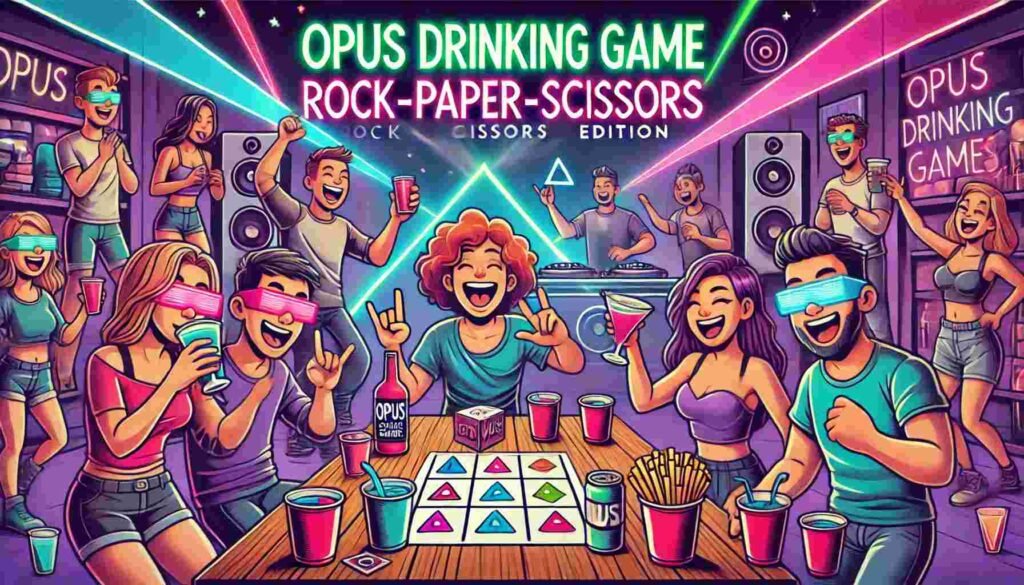The Opus drinking game is a fast-paced, dice-based party activity that blends chance, laughter, and questionable decision-making into one highly social package. It’s beloved in dorm rooms, living rooms, and questionable basements everywhere because it’s easy to learn, requires almost no setup, and gets everyone involved—whether they like it or not.
Table of Contents
What is the Opus Drinking Game?
Nobody’s entirely sure who invented it—possibly some bored college student armed with a pair of dice and a fridge full of beer—but what matters is that it’s spread across friend groups and internet forums like wildfire. People keep coming back to it because it’s chaotic, unpredictable, and endlessly customizable.
Unlike card games, you don’t have to remember complicated rules or buy special decks. If you have dice, drinks, and people, you can play. If you don’t have dice, there’s an app for that (or about fifty).
Opus Dice Game Rules – How to Play Step-by-Step

What You Need to Play Opus Drinking Game
- The song “Opus” by Eric Prydz
- One or two standard six-sided dice
- One shot glass for each die in play (usually 1–2)
- Drinks for the shots (alcoholic or non-alcoholic)
- A table or flat surface with enough room to roll dice
- At least 3 players (4–8 makes it even more chaotic)
Setting Up the Game
Sit in a circle or around a table. Decide who goes first—roll for highest number or just pick the person most eager to humiliate themselves. Play proceeds clockwise.
The Turn Sequence
- Start playing “Opus” by Eric Prydz from the very beginning.
- The rules for each roll:
- Roll a 1 → Pass the die to the person on your left.
- Roll a 6 → Pass the die to the person on your right.
- Roll anything else → Keep rolling until you get a 1 or a 6.
- When the Drop Hits: Any player who is currently holding a die when the drop happens must take the shot.
Tips for Maximum Fun
- Using two dice speeds up the pace and increases chaos.
- Pick songs with dramatic build-ups to create tension.
- Switch songs for variety (suggest “In the Air Tonight” by Phil Collins or custom tracks made for Opus-style play).
- Keep shots reasonable in strength if you’re playing multiple rounds.
Opus Drinking Game Variations to Try

1. Rock-Paper-Scissors Opus (No Dice Needed)
This high-speed, dice-free variation swaps rolling for quick-fire rock-paper-scissors battles like this TikTok video shows:
- Pair up with the person next to you.
- Start “Opus” and immediately begin rapid rounds of rock-paper-scissors — no breaks between throws.
- Each time you lose, you move to face the next person in the circle (or swap opponents in a small group).
- Keep cycling through opponents as fast as possible while the music builds.
- When the drop hits, all current losers (the people who just lost their round when the drop landed) take the penalty shot or sip.
This version is faster, more frantic, and requires no props — just fast hands and even faster reactions.
2. Dare or Drink Opus
This twist adds a mischievous social challenge to the standard dice rules:
- Play the regular Opus setup with 1s passing left and 6s passing right.
- Whenever you roll a 1 or a 6, you have two choices:
- Assign a dare to any other player.
- Keep the original rule and assign a drink penalty.
- Dares should be quick, funny, and safe — for example:
- Speak in an accent until your next turn
- Balance a coaster on your head for 30 seconds
- Swap seats with someone mid-round
- Do a 10-second interpretive dance to the build-up
- If a player refuses the dare, they must take the drink penalty instead.
This version keeps everyone engaged and encourages creativity. It also breaks up the constant drinking with moments of silliness — though the dares often lead to even more laughter than the original penalties.
3. Multiple Song Roulette
Perfect for groups that have mastered the original game and want extra unpredictability:
- Create a playlist with “Opus” plus other long build-up tracks that have a dramatic drop (e.g., “In the Air Tonight” by Phil Collins, “Animals” by Martin Garrix, or any custom build-up remix).
- Use shuffle mode so nobody knows which song will play next.
- Keep the same dice rules — roll, pass on 1s and 6s, and whoever holds dice at the drop drinks.
- The catch: different songs have different build-up lengths, so you can’t “time” when to roll slower or pass intentionally.
This version turns the game into a mix of skill, luck, and musical bluffing. Players might get caught off-guard when a shorter build-up song suddenly drops, forcing them to drink before they’re ready.
Best Songs for Opus-Style Gameplay (Beyond Opus)
The magic of the Opus drinking game comes from the tension — that delicious build-up where you can hear your heart pounding faster than the bass.
1. The Dramatic Build-Up Classics
- In the Air Tonight – Phil Collins
- Iconic drum fill that hits like a freight train. Perfect for catching players off-guard.
- Animals – Martin Garrix
- Fast, high-energy build-up that keeps hands moving.
- Titanium (Alesso Remix) – David Guetta ft. Sia
- Powerful crescendo, works great with larger groups.
2. Electronic Bangers
- Strobe – deadmau5
- Long, slow build — perfect for really stretching out the suspense.
- Calling (Lose My Mind) – Sebastian Ingrosso, Alesso
- Smooth start, then an explosive drop.
- Levels – Avicii
- Familiar, uplifting, and dangerously singable mid-game.
3. The Fake-Outs
- Sandstorm – Darude
- Everyone thinks they know when it’s coming… and then it doesn’t.
- Scary Monsters and Nice Sprites – Skrillex
- Multiple build-ups and drops for bonus chaos.
- Bohemian Rhapsody – Queen
- Not EDM, but the “So you think you can stone me…” section into the rock break is pure surprise territory.
Pro Tip: If you’re running “Multiple Song Roulette,” hide the playlist name and shuffle it. The mystery is half the fun — nothing messes with a player’s confidence like thinking they have 30 seconds left, only for the drop to explode in their face.
How to Host the Perfect Opus Party
If you want Opus night to be the stuff of legends, it’s all about setting the stage. Sure, the game itself is chaotic fun, but the atmosphere you create will crank it up to a whole new level.
1. The Setup
- Space: Clear enough room for players to sit in a circle or around a table so dice (or challengers) can be passed without knocking over drinks.
- Surface: Use a large, stable table for dice rolls — nothing kills the vibe like crawling under a couch to find a runaway die.
- Lighting: Dim the lights and throw on a party LED or strobe to sync with the music drop.
2. The Drinks
- Main Shots: Pick something everyone can tolerate for multiple rounds. Think mid-strength, not pure jet fuel.
- Themed Drinks: Create an “Opus Shot” with your choice of spirits + mixer so the game feels special.
- Non-Alcoholic Options: Make sure you’ve got mocktails for designated drivers and players pacing themselves.
3. The Music
- Start with “Opus” by Eric Prydz for the first round.
- Build a playlist with other drop-heavy songs (for when you’re ready to mix it up).
- Use a good speaker — laptop audio will not cut it.
4. The Energy
- Get the group hyped before the first round.
- Encourage people to trash talk, cheer, and make noise during the build-up.
- Keep the game moving — slow rounds kill the suspense.
Opus Drinking Game House Rule Generator
One of the best things about Opus is how easily you can spice it up with house rules. Here’s a menu of chaos — pick a few before starting or let the dice decide mid-game.
Funny Movement Rules:
- Reverse Pass: If someone yells “OPUS!” during the build-up, dice passing direction reverses.
- Hands Up: Whenever a player rolls doubles, everyone must raise their hands — last person to do it drinks.
Penalty Add-Ons:
- Two Drops, Double Trouble: If the song has two drops, both count.
- Shot Swap: If you win a dare, you can assign your penalty to someone else.
Physical Challenges:
- Dice Dance: Before passing the die, the roller must stand up and spin once.
- Roll Crawl: You have to roll the dice from the floor instead of the table for one turn.
Wildcard Rules:
- Mimic Master: If you’re holding a die, you must mimic another player until you pass it.
- Freeze Frame: At random intervals, someone yells “freeze” — anyone moving drinks.
House rules keep the game unpredictable and let you tailor the chaos to your group’s style. Just remember: the best rules are the ones that make people laugh so hard they almost miss the drop.
Comparing Opus to Other Dice Drinking Games
1. Opus vs. Mexicali
Game Style:
- Mexicali: Bluffing-based — talk your way out of drinking and into making others drink.
- Opus: Straightforward dice chaos — no lying, just non-stop rolling and passing.
Pace:
- Mexican: Slower, with time to scheme.
- Opus: Fast-paced, adrenaline-heavy.
Fun Factor:
- Mexican: Great for smooth talkers.
- Opus: Great for people who think “strategy” is just rolling faster than the person next to you.
2. Opus vs. Three Man
Game Style:
- Three Man: One player is “Three Man” and drinks constantly for certain rolls.
- Opus: Drinking responsibility is spread evenly across players.
Impact on Players:
- Three Man: Can quickly burn out one unlucky player.
- Opus: Keeps everyone in the game and avoids long-term targeting.
Fun Factor:
- Three Man: Hilarious if you’re not the Three Man.
- Opus: Hilarious for everyone equally.
3. Opus vs. Ship Captain Crew
Game Style:
- Ship Captain Crew: Structured, requires rolling in a specific order (6 for ship, 5 for captain, 4 for crew).
- Opus: Unstructured — roll, pass, and try not to hold the dice when the drop hits.
Pace:
- Ship Captain Crew: Slow and methodical.
- Opus: Immediate, high-energy, and constant action.
Fun Factor:
- Ship Captain Crew: Perfect for players who like step-by-step rules.
- Opus: Perfect for players who prefer instant gratification and chaos.
Final Thoughts on the Opus Drinking Game
Opus is easy to learn, impossible to play without laughing, and endlessly adaptable. Keep it safe, keep it fun, and don’t be afraid to invent your own bizarre house rules. The only real requirement is dice, drinks, and a willingness to embarrass yourself in front of friends.
